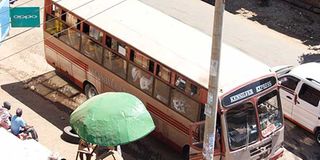How Meru’s Kensilver buses have remained safe on the road

A Kensilver Express bus at its station in Meru town. The buses which ply between Meru and Nairobi have over the years earned trust among travellers for their safety and sticking to traffic rules. PHOTO | DAVID MUCHUI | NATION MEDIA GROUP
What you need to know:
- Its many years of service, on the winding and bumpy Meru-Embu road, has seen it earn trust among travellers.
- While other matatus take about four hours to travel from Meru to Nairobi, it will take you six hours on a Kensilver bus.
- Mr Charles Barasa says Kensilver drivers do not operate with targets hence they do not have to drive at crazy speeds.
When a Kensilver Express bus was involved in a road crash near the Nithi Bridge in April this year, many residents of Meru could not come to terms with how it happened.
This is because for the last 30 years, Kensilver buses, which ply the Meru-Nairobi route, have been perceived as some of the safest on the road, with rare cases of road crashes.
The bus company is so famous such that before the advent of technology, its offices were considered a vital landmark for people from Meru who were new to the city.
Its many years of service, on the winding and bumpy Meru-Embu road, has seen it earn trust among travellers.
SAFETY
So respected is Kensilver that among the Ameru, a joke has it that you can put a child on the company’s bus and pick him or her at any of its offices safely.
The buses are revered for sticking to traffic rules, timeliness and discipline among the staff.
But youthful travellers do not seem to like the buses “for their slow speed” as the buses strictly stick the 80km per hour speed limit set for public service vehicles.
While other matatus take about four hours to travel from Meru to Nairobi, it will take you six hours on a Kensilver bus.
It is an open secret that most matatu drivers have tampered with their speed governors, allowing them to move above the set speed limit.
According to Mr Charles Odhiambo, the Kensilver buses supervisor, many competitors have ventured on the Meru-Nairobi route but eventually quit and left them in business.
With a fleet of about 30 buses, travellers moving between Meru and Nairobi are assured of getting a vehicle every 30 minutes.
DISCIPLINE
“In the matatu industry, management is everything. We are very keen on discipline among our staff because most accidents are as a result of careless driving. We are very keen on the small issues that can cause accidents on the road,” Mr Odhiambo said.
He says the management is very strict on speed, passenger capacity, the state of the driver and maintenance of the buses.
“Our buses must maintain the 80km per hour speed because they are monitored. We ensure they are well-maintained with fulltime mechanics based at every station. Our buses are 40-seaters and must not exceed that number,” Mr Odhiambo said.
NO CRAZY SPEEDS
Mr Charles Barasa, who is based at the Meru office, says their drivers do not operate with targets hence they do not have to drive at crazy speeds.
“Our drivers rest for up to eight hours before embarking on another journey. In case of a bus breaking down on the road, there is always another one on standby to pick up the passengers. The driver and conductor take responsibility in case they do anything centrally to the law,” Mr Barasa said.
He adds that their cautious speed, predictable departure times and disciplined staff has earned them loyal customers.
“Most of our customers have remained loyal for many years. However, the youth who like high speeds and loud music sometimes complain about our services. But our policy is that there should be no music in the bus,” he said.
The National Transport and Safety Authority has blamed reckless driving for most road crashes in Kenya, even as debate rages on how to reduce them.
More than 2,300 people have lost their lives on Kenyan roads between January and October 2018.
Mr Odhiambo says the road carnage can be contained if operators improve the management systems of matatus.





